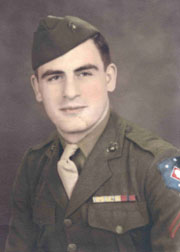Michael John Bonagura
(1923 – 1993)
Cpl. USMC 1940 -1945

My father was a Marine Raider on Guadalcanal. He was in the 1st Marine Division. I know from his records that he started out in the 5th Marines, 2nd Battalion, but somehow he wound up in the Raiders — notice the Raider patch he’s wearing in the picture. The details of that story, like so many others, I never fully understood.
He enlisted in June of 1940, before Pearl Harbor, as he was always fond of telling me. Somehow that distinction mattered to him — The Old Breed versus all the guys who enlisted after December 7, 1941 — a few months seemed to make all the difference, though in the end they were all called The Old Breed. In fact Michael had dropped out of school after finishing tenth grade at Belleville High in New Jersey. He altered his birth date on his birth certificate and forged his mother’s signature on a parental consent form so he could enlist at 16.
As a kid, he always loved the Navy, and I know initially he wanted to join the Navy, but I’m sure the local recruiters took one look at him and saw Marine written all over him. They told him his hammertoe disqualified him from joining the Navy; apparently he’d be unstable walking on a ship or something like that. Of course, marching for miles and miles with a pack on your back would be fine.
***
Over the years he always talked a lot about the Marines and not much about the war. All I knew about his war experiences, traits that carried over onto his life with his family, were that he hated rain, nighttime, and almost anything Japanese.
But he loved the Marine Corps, and he was a good fit as a Marine. He told me he would have made a career out of the Marines had he not suffered so acutely from Malaria. Recruit training was easy for him (as a tenth grader he played semi-pro football on Sundays for the Newark Bears!). The food in the Marines was good and there was plenty of it, and he got to travel and see places he’d never otherwise have seen — all over the United States, Cuba, New Zealand, Samoa, the South Pacific islands, Australia, California, the Pacific Northwest — and probably many other places I don’t even know about.
***
He brought more than just memories home from the Pacific. He suffered terribly from PTSD for the rest of his life after the war — and that’s a long time when you go into battle at 17. He died of service-connected disabilities at 69 — his father lived to be 96 — so I guess dad hoped he’d live a long life, but it wasn’t to be. He lived longer than a lot of other Guadalcanal vets though.
My greatest admiration for my father comes from the fact that in spite of how terribly the war had damaged him, he still came back and made something special of his life. Together with a great deal of sacrifice from my mom, Trudi, they really built a good life and gave their children opportunities they never had. I think the guys who came back and lead productive lives all had at least one thing in common — a woman who was willing to give freely of herself to help heal them — I don’t know if the sacrifices of women who married combat veterans have ever been fully documented or even appreciated, except, of course, by the men themselves.
Michael went on to earn a Master’s Degree from Seton Hall College and then taught history for three decades — earning a reputation among students that few teachers can even dream about. He never wanted the young people to suffer as he had — he never wanted to pass on all the bad things that had happened to him; instead he wanted to heal, himself and others. Bad things happen to everyone, but when someone becomes a better person, and after the experience decides that they must give even more to others because of the suffering they’ve experienced — well, that’s a rare person in my mind. He was that kind of person and everyone knew it.
Of course, he had his faults, his scars, and his pain, but I still miss him, most every day. Yet, through writing The Tiger is Dead, creating this web site, and meeting and interviewing all the Marines I’ve encountered, I’ve felt much closer to understanding my father and appreciating his sacrifices. When I went to the Marine Corps Museum in San Diego and saw the Raider Room, I really felt close to him. Seeing uniforms they wore, weapons they carried, and pictures of all the other Raiders stirred something inside me.
The more I learn of the Guadalcanal campaign, the more amazed I am by what my dad and so many others like him went through; anyone who says kids grow up fast today has no concept of history — there’s just no comparison — most of those guys were teenagers when they did what they did — and simply put, what they did was to preserve our way of life and pass on that freedom to subsequent generations. I often wonder if we've lived up to their sacrifice. Personally, I know I have a long way to go, but I’m moving in the right direction.

